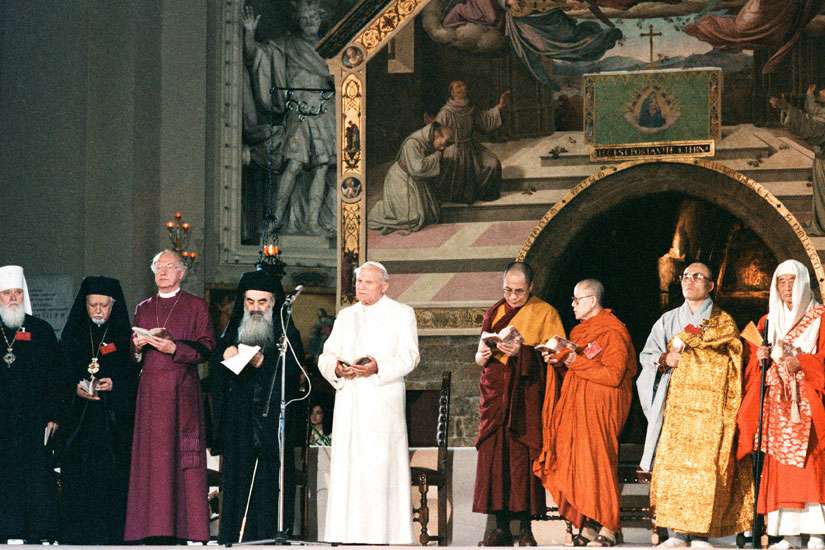The event Sept. 18-20 was sponsored by the Rome-based Community of Sant'Egidio, the Diocese of Assisi and the Franciscan friars to reflect on the theme, "Thirst for Peace: Faiths and Cultures in Dialogue."
At the opening assembly, attended by Italian President Sergio Mattarella, Orthodox Ecumenical Patriarch Bartholomew of Constantinople said, peace "starts from within and radiates outward, from local to global."
"Thus, peace requires an interior conversion, a change in policies and behaviours," he said.
Humanity's relationship with creation "has a direct impact on the way in which it acts toward other people," said the patriarch, known for his decades of work on the connection between Christian spirituality and ecology.
"Any ecological activity will be judged by the consequences it has for the lives of the poor," he said. "The pollution problem is linked to that of poverty."
Recalling his visit to the Greek island of Lesbos with Pope Francis, the patriarch said they saw examples of how the world has treated migrants "with exclusion and violence."
Echoing Patriarch Bartholomew's sentiments, Andrea Riccardi, founder of the Community of Sant'Egidio, said the spirit of the 1986 Assisi meeting is still alive, despite a "complex and fragmented time with its challenges," particularly with new fears arising due to war and migration.
The "simple and profound" gesture of religious leaders standing together for peace, he said, "gave witness to their respective faithful that it was possible to live together."
"Dialogue is the intelligence to live together: either we live together or together we will die," he said.
The meeting featured dozens of interreligious panel discussions on topics ranging from the environment and migration to dialogue and the media.
Discussing the 30th anniversary of the 1986 peace gathering and its relevance today, Bishop Miguel Angel Ayuso Guixot, secretary of the Pontifical Council for Interreligious Dialogue, said, "The spirit of Assisi is not a vague feeling, a sentimentalism or nostalgic memory," but an example that "peace is not possible without prayer."
"Prayer is one of the means for implementing God's design among people," he said. "It is apparent that the world cannot give peace; it is a gift from God that we must ask from Him through prayers."
The religious leaders who were gathering to pray for peace, he added, are "here to show that religion is not the problem but is part of the solution to bring peace and harmony in our societies."
"I hope that the spirit of Assisi may be deeply rooted in our hearts so that it can keep enlightening this world that is marked by the darkness of hatred and violence," he said.
Mohammad Sammak, secretary general of Lebanon's Christian-Muslim Committee for Dialogue, stressed the need to promote "the message of the spirit of Assisi to all nations" in order for peace to prevail, particularly between Christians and Muslims.
While differences exist between the two faiths, he said, "it does not mean that we have to be the enemy of one another." On the contrary, the differences between religions can complement and complete each other. "And this process of common belief and common respect is manifested in the spirit of Assisi," Sammak said.
Argentine Rabbi Abraham Skorka, a longtime friend of Pope Francis, also addressed the panel and lamented that violence, hate and uncertainty "has become more and more one of the characteristics of human reality." He also denounced the "exacerbated egoism" prevalent in politics today and racist overtones by individuals who "are holding leadership positions in well-established democratic countries."
"Uncertainty about the future to come and no clear ethical rules respected by peoples and nations build the best scenario for the rise of demagogic and corrupted leaders," Skorka said.
However, despite humanity's worsening condition, he said, the "voice calling for justice, peace and love" that emerged in1986 "has not been silenced."
"The spiritual fire lit then gathers us today," he said. "The hope of peace, which is the core of Jewish, Christian and Islamic faiths, continues palpitating in the hearts of many," he said.


